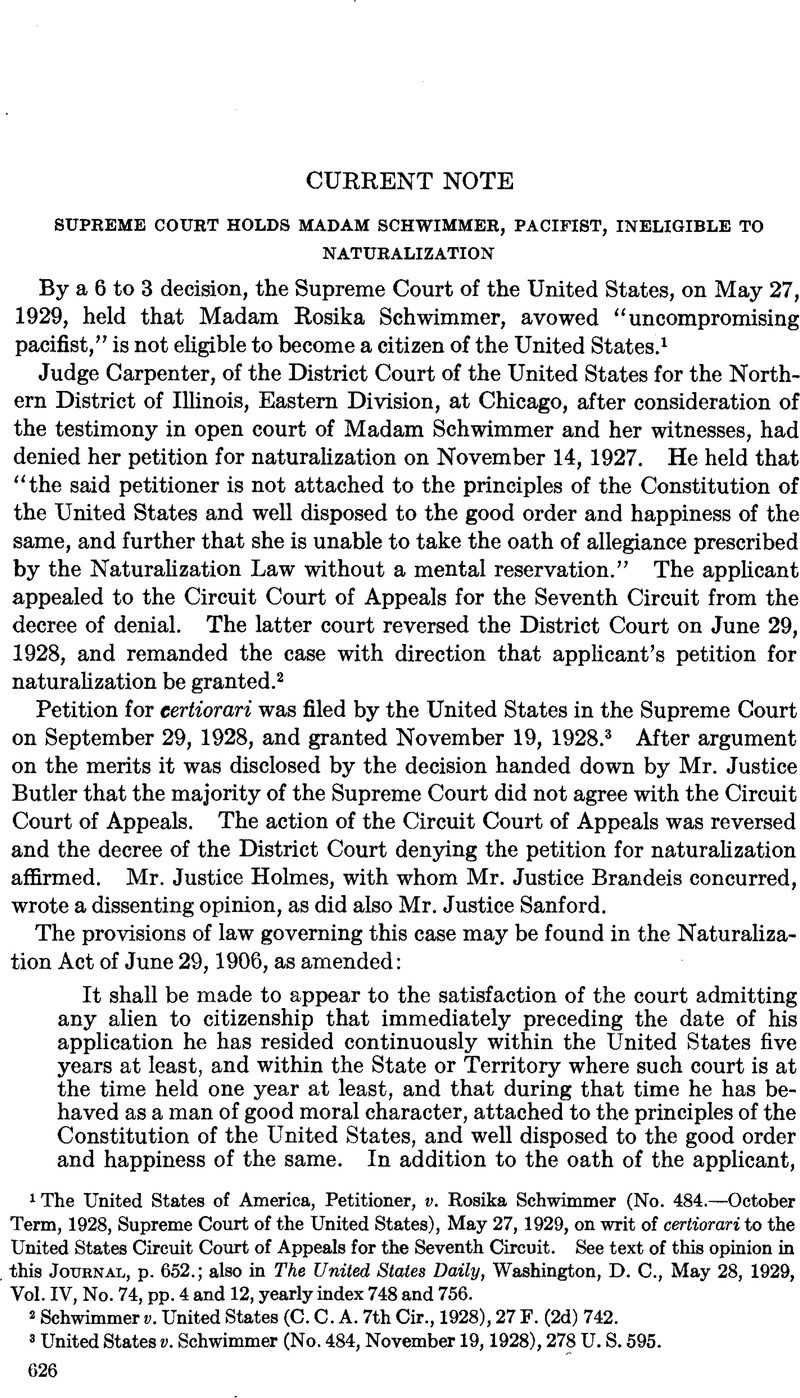No CrossRef data available.
Article contents
Supreme Court Holds Madam Schwimmer, Pacifist, Ineligible to Naturalization
Published online by Cambridge University Press: 04 May 2017
Abstract

- Type
- Current Note
- Information
- Copyright
- Copyright © American Society of International Law 1929
References
1 The United States of America, Petitioner, v. Rosika Schwimmer (No. 484.—October Term, 1928, Supreme Court of the United States), May 27, 1929, on writ of certiorari to the United States Circuit Court of Appeals for the Seventh Circuit. See text of this opinion in this Journal , p. 652.; also in The United States Daily, Washington, D. C., May 28, 1929,Vol. IV, No. 74, pp. 4 and 12, yearly index 748 and 756.
2 Schwimmer v. United States (C. C. A. 7th Cir., 1928), 27 F. (2d) 742.
3 United States v. Schwimmer (No. 484, November 19,1928), 278 U. S. 595.
4 Subdiv. 4, Sec. 4, Act of June 29, 1906, 34 Stat. 598; U. S. C. t. 8, Sec. 382. This subdivision has been amended by Sec. 6(b), Act of March 2, 1929, Public—No. 962, effective July 1, 1929. See text of the latter in Supplement to this Journal , Vol. 23, No. 2, April, 1929, pp.115-116.
5 Subdiv. 3, Sec. 4, Act of June 29,1906,34 Stat. 597-598; U. S. C. t. 8, Sec. 381.
6 But see United States v. Raverat (D. C. Mont., 1915), 222 Fed. 1018, in which the court said: “ Under the present law [Act of June 29, 1906, 34 Stat. 596] even beliefs, thoughts, internal acts, may disqualify.”
And Sec. 7, Act of 1906, supra; 34 Stat. 598-599; U. S. C. t. 8, Sec. 364, provides: “ That no person who disbelieves in or who is opposed to organized government, or who is a member of or affiliated with any organization entertaining and teaching such disbelief in or opposition to organized government, or who advocates or teaches the duty, necessity, or propriety of the unlawful assaulting or killing of any officer or officers, either of specific individuals or of officers generally, of the Government of the United States, or of any other organized government, because of his or their official character, or who is a polygamist, shall be naturalized or be made a citizen of the United States.” (Italics supplied.)
7 There seems to be a popular misunderstanding that in filing a declaration of intention or petition for naturalization in the United States the alien at that time renounces allegiance to the country of which he is a citizen or subject. This is not true. The applicant merely swears that it is his intention to renounce his allegiance in the future. The oath of renunciation is not taken unless the applicant is admitted to citizenship
8 Selective Draft Law Cases (1918), 245 U. S. 366, 378.
9 It should be noted that the courts quite generally have denied naturalization to those aliens who were registered during the World War under the draft law (Secs. 2 and 4, Act of May 18, 1917; 40 Stat. 76, 77-78; and Ch. XII, Secs. 1, 2, 3 and 4, Act of July 9, 1918, 40 Stat. 845, 884-885), but who claimed exemption from military service on the ground of their alienage. In all, thirty thousand applicants have been refused citizenship for this attitude on their part.
10 Schenck v. United States (1919), 249 U. S. 47, 52, in which two defendants had been convicted under the Espionage Act of June 15, 1917, of obstructing the recruiting andenlistment service of the United States during the war with Germany. “ When a nation is at war many things that might be said in time of peace are such a hindrance to its effort that their utterance will not be endured so long as men fight and that no court could regard them as protected by any constitutional right.”
11 The United States of America, Petitioner, v. Rosika Schwimmer (No. 484.), supra.


